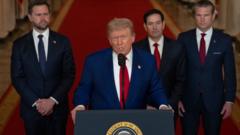Is Trump Celebrating Too Soon Amid Ongoing Challenges?

Understanding the Complex Dynamics of Trump’s Foreign Policy in the Middle East
As the geopolitical landscape in the Middle East continues to evolve, the actions and decisions of global leaders have far-reaching implications. Recently, former President Donald Trump shared a personal message from NATO Secretary General Mark Rutte praising his bold military actions against Iran’s nuclear facilities. This unexpected endorsement highlights both the complexities of international diplomacy and the shifting allegiances in a volatile region.
A Shift in NATO Relations
Trump has previously expressed skepticism regarding NATO, questioning the mutual defense agreements and the financial contributions of member nations. However, Rutte's congratulatory message indicates a nuanced relationship, one that is influenced by recent military actions. The fact that Rutte acknowledged Trump’s decisive actions in Iran underscores a significant shift in diplomatic dynamics, particularly in light of NATO's commitment to collective security.
Rutte's message not only celebrated Trump's military intervention but also reinforced the notion that NATO allies are increasingly aligning with U.S. strategies when it comes to countering threats from Iran. This is particularly relevant as Trump heads to the NATO summit in the Netherlands, where member nations are reportedly aligning to meet his demand for increased defense spending.
Military Action and Its Implications
Trump’s military decision to strike Iran’s nuclear facilities has been lauded by some as a necessary action to prevent nuclear proliferation. The immediate result was a ceasefire that halted the escalating conflict between Israel and Iran. However, while the White House claims that the bombing raids “obliterated” Iran's nuclear capabilities, Pentagon sources suggest that the damage may be less significant than reported.
Intelligence assessments indicate that Iran’s nuclear program has only been set back by a few months, raising questions about the effectiveness of the military intervention. The ambiguity surrounding the status of Iran’s enriched uranium stockpile and the potential existence of undisclosed research facilities poses a challenge for ongoing diplomatic efforts.
The Fragility of Ceasefires in the Middle East
While a ceasefire is currently in place, the history of Middle Eastern truces suggests that such agreements are often fragile. The interplay of power among various factions in the region can quickly unravel any semblance of peace. The ongoing instability in Syria illustrates the risks associated with weakened authoritarian regimes, and this could easily spill over into Iran, especially if its leadership is perceived as vulnerable.
Moreover, Trump’s rhetoric of “love, peace, and prosperity” for Iran contrasts starkly with the reality of persistent chaos and potential regional turmoil. The situation remains precarious, and the long-term consequences of military intervention are yet to be fully realized.
Domestic Political Ramifications
Domestically, Trump's critics have warned of the potential pitfalls of a military approach, and there were indications of resistance even within his party. However, Republican Congressman Thomas Massie’s decision to abandon efforts to curtail Trump's military powers in Iran provides the former president with a political advantage, allowing him to promote what he considers an unqualified success.
This political landscape has created an environment where Trump can leverage international accolades to bolster his standing among supporters, despite the complexities and contradictions inherent in his foreign policy approach. JD Vance, Trump’s vice president, recently articulated a simplistic three-part foreign policy doctrine that highlights the reactive nature of Trump’s international strategy.
The Contradictions of Trump's Foreign Policy
Trump's foreign policy has often appeared to be more tactical than strategic, leading to a series of contradictory actions. Over the past few weeks, he has alternated between distancing the U.S. from Israel’s aggressive stance on Iran and directly involving the American military in that conflict. His calls for “unconditional surrender” from Iran contrasted sharply with subsequent negotiations aimed at achieving a ceasefire.
This inconsistency raises questions about the effectiveness of Trump's approach. The ability to pivot quickly from one stance to another may yield short-term gains but lacks the strategic coherence necessary for long-term stability. As the administration celebrates what they deem as successes, the underlying issues that prompted the military intervention remain unresolved.
Looking Forward: The Ongoing Challenges
As Trump prepares to engage with NATO allies in Europe, it is essential to recognize that the conflicts he inherited, such as those in Gaza and Ukraine, persist alongside the recent developments in Iran. While peace has been temporarily secured with a ceasefire, the broader geopolitical challenges remain unaddressed.
The landscape of international relations is often characterized by uncertainty, and the potential for escalation continues to loom large. The implications of Trump's military actions and the subsequent diplomatic maneuvers will be scrutinized closely in the coming weeks and months.
Conclusion
In summary, the recent developments surrounding Trump's military actions in Iran and the subsequent diplomatic responses illustrate the complexities of modern foreign policy. While immediate successes may provide a temporary sense of victory, the long-lasting effects of such interventions require careful consideration.
The interplay between military action and diplomatic engagement will continue to shape the future of U.S. relations in the Middle East. As global dynamics shift, the responsibility lies with leaders to navigate these turbulent waters wisely. The question remains: Can peace be sustained in a region marked by historical conflict and instability?
FAQs
What was the message from NATO Secretary General Mark Rutte to Trump?
Mark Rutte praised Trump for his military action in Iran, calling it “extraordinary” and suggesting it would lead to greater success at the NATO summit regarding defense spending.
How did Trump's military actions impact the conflict between Israel and Iran?
Trump's decision to strike Iran's nuclear facilities prompted a ceasefire between Israel and Iran, temporarily halting hostilities that had escalated over two weeks.
What are the implications of the ceasefire between Israel and Iran?
While a ceasefire is currently in place, its fragility poses risks, as the underlying tensions and power dynamics in the region remain unresolved.
What are the criticisms of Trump's foreign policy approach?
Critics argue that Trump's foreign policy is reactive and lacks strategic depth, leading to inconsistencies and potential long-term instability in international relations.
As we reflect on these recent developments, it is crucial to consider the broader implications of military interventions and the role they play in shaping global peace. How do you view the future of U.S. foreign policy in the Middle East? #ForeignPolicy #MiddleEast #TrumpAdministration
Published: 2025-06-24 22:07:05 | Category: wales



